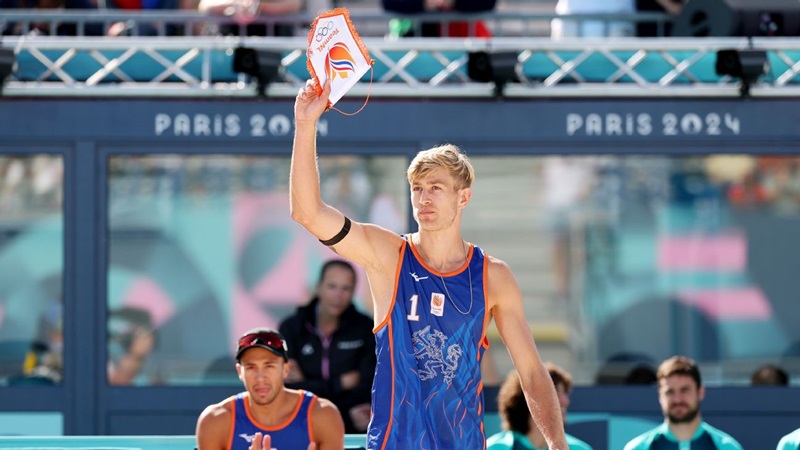Convicted Rapist Van de Velde Faces Booing on Olympic Debut
On his Olympic debut, convicted rapist Van de Velde faced a barrage of booing from the crowd. Despite his past crimes, Van de Velde was allowed to compete in the games, sparking outrage among spectators and fellow athletes. Many argued that allowing him to participate in such a prestigious event sent the wrong message and undermined the values of the Olympics. As Van de Velde stepped onto the field, the boos echoed throughout the stadium, a stark reminder of the controversy surrounding his presence. While some may argue that he has served his time and deserves a second chance, others believe that his actions should not be forgotten or forgiven.
The tension in the air was palpable as Van de Velde began his performance, with many wondering if he would be able to overcome the negative reception from the crowd. Despite the hostility, Van de Velde remained focused and determined, showcasing his skills and determination on the field.
However, his performance was overshadowed by the cloud of his past actions, leaving many questioning the decision to allow him to compete in the first place. As the event came to a close, the boos continued to ring out, a stark reminder of the controversy that surrounded Van de Velde’s presence at the Olympics. In the end, his debut was marred by the disapproval of the crowd, serving as a reminder of the ongoing debate surrounding the inclusion of convicted criminals in high-profile events.
A Controversial Debut
The debut of the film “Cuties” sparked intense debate and divided opinions among viewers and critics alike. The film, directed by Maïmouna Doucouré, follows the story of an 11-year-old Senegalese girl who joins a dance group and navigates the complexities of growing up in a hypersexualized society. Some praised the film for its bold and honest portrayal of the challenges faced by young girls in today’s world, while others condemned it for its provocative and potentially exploitative content.
The controversy surrounding “Cuties” raised important questions about the portrayal of children in media, the impact of sexualization on young girls, and the boundaries of artistic expression. Despite the heated discussions, the film ultimately sparked a much-needed dialogue about the intersection of culture, gender, and sexuality in the modern age.
Whether one believes the film to be a powerful commentary on societal norms or a dangerous portrayal of underage sexuality, “Cuties” undeniably made a significant impact on the film industry and ignited conversations about the importance of responsible storytelling and representation in media. As the debate continues to rage on, one thing remains clear: “Cuties” will be remembered as a controversial debut that challenged societal norms and pushed the boundaries of artistic expression.

Background and Controversy
Background and controversy often go hand in hand, especially when discussing controversial topics such as politics, religion, and social issues. The background of a situation or topic provides context and history, helping to shape opinions and perspectives. However, controversy arises when different individuals or groups have conflicting views or beliefs about a particular issue. This can lead to heated debates, arguments, and even division among people. The controversy surrounding a topic often stems from differing values, beliefs, and experiences, making it difficult to find common ground.
In some cases, controversy can be beneficial, sparking important discussions and leading to positive change. However, it can also be destructive, causing tension and animosity among individuals or groups. It is important to approach controversial topics with an open mind, seeking to understand different perspectives and viewpoints. By engaging in respectful and constructive dialogue, it is possible to find common ground and work towards solutions that benefit everyone involved. Ultimately, background and controversy are intertwined, shaping our understanding of complex issues and prompting us to critically examine our beliefs and values.
Reactions from the Olympic Community
The reactions from the Olympic community regarding recent events have been mixed. Some individuals within the community have expressed concern over the impact these events may have on the integrity of the Games, while others have defended the athletes involved, citing the pressure and expectations they face. There is a sense of disappointment among many, as the Olympics are meant to be a celebration of sport and unity, and any actions that detract from this can be seen as damaging to the overall spirit of the Games.
However, there are also those who believe that these incidents serve as a reminder of the complexities and challenges that come with being an elite athlete, and that it is important to consider the circumstances and pressures that may have contributed to these actions. Ultimately, the reactions from the Olympic community highlight the need for ongoing discussions and efforts to address issues related to athlete conduct and the expectations placed on them. It is clear that there is a desire to uphold the values of the Olympics and ensure that all athletes are held to a high standard of sportsmanship and integrity.

The Role of Public Opinion
Public opinion plays a crucial role in shaping the decisions and actions of individuals, organizations, and governments. It serves as a barometer of societal attitudes and values, reflecting the collective beliefs and sentiments of the population at a given time. Public opinion can influence public policies, drive social movements, and impact the direction of society as a whole. It can create pressure on leaders to address pressing issues, promote change, and uphold the values that are important to the community.
Public opinion also helps to hold those in positions of power accountable for their actions and decisions, as it serves as a check on their authority. Additionally, public opinion can shape public discourse and debate, providing a platform for different perspectives and viewpoints to be heard and considered.
In this way, public opinion serves as a powerful force for shaping the direction of society and influencing the decisions and actions of individuals and institutions. It is important for individuals to be informed and engaged in the issues that matter to them, as their opinions and voices can have a significant impact on the world around them. Ultimately, public opinion is a reflection of the collective consciousness of a society, and it is essential for a healthy and functioning democracy.

Van de Velde’s Response
In response to the recent incident involving Van de Velde, the public has been buzzing with speculation and opinions. Some believe that his actions were unethical and disrespectful, while others argue that he was simply trying to protect his own interests. Regardless of where one stands on the issue, it is clear that Van de Velde’s response has sparked a conversation about the responsibilities and boundaries of individuals in positions of power.
Many are questioning the motives behind his actions and whether they were driven by personal gain or a genuine concern for the greater good. Some are calling for accountability and transparency in his decision-making process, while others are willing to give him the benefit of the doubt. Ultimately, Van de Velde’s response has raised important questions about the moral compass of those in positions of authority and the impact their actions can have on the community as a whole. It remains to be seen how this controversy will be resolved and what lessons will be learned from this experience.
